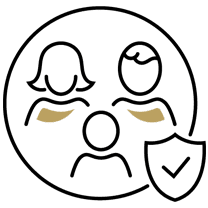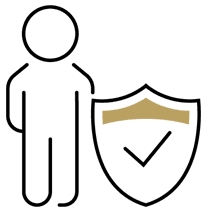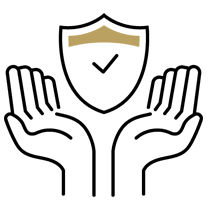
Why Marchman Act Addiction Treatment
Our team of Florida intervention specialists and treatment professionals are experienced with the challenges of involuntary treatment cases. If you are concerned about a loved one, family member, or client, you can file a Marchman Act petition to help them find the life-saving treatment they need. We share and support your concerns for someone struggling with addiction, and are ready to provide a short- or long-term addiction treatment plan that can guide them to recovery.

What is Marchman Act?
Florida law provides a way for medical professionals, spouses, guardians, and friends of someone struggling with addiction to petition the court to order involuntary assessment and treatment for drug or alcohol abuse. Under certain conditions, the Marchman Act allows a responsible adult to file the paperwork asking for court-ordered treatment.
What is the Marchman Act exactly? Officially named the Hal S. Marchman Alcohol and Other Drug Services Act, the Marchman Act of 1993 allows responsible adults to ask the court to order emergency assistance, temporary detention, and a specific length of involuntary treatment.
The statute allows the court to issue a drug rehabilitation order or involuntary alcohol treatment for those who have lost the ability to make reasonable treatment decisions because of the disease of addiction. Prescription drugs, alcohol, or illegal street drugs including heroin, ecstasy, LSD, cocaine, and methamphetamine can be grounds for a Marchman Act judgement.
Is Filing Under the Marchman Act in the Best Interest of Someone You Care For?

Who Can File a Marchman Act Petition?
There is a separate process for law enforcement or primary care physicians to order short-term protective custody or emergency hospital admissions. When a friend or family member is the one initiating the Marchman Act process, they start by filing a petition. These people are eligible to petition the court in the interests of helping another adult:
- Their spouse or life partner
- A relative or guardian
- A person with a valid power of attorney
- An unrelated and responsible adult who is aware of the substance use disorder
Children under the age of 18 can receive court-ordered treatment and evaluation under a Marchman Act order if a petition is filed by their parent, guardian, custodian, or licensed medical or mental health professional.
How Do I File a Marchman Act Petition in Florida?
You can file the Marchman Act forms at your local county clerk or comptroller’s office in the state of Florida. While this is a state statute, laws like the Marchman Act in other states may allow you to intervene for a friend or relative who lives elsewhere.
Many people work with an attorney to help them navigate the Marchman Act procedure, because failing to provide the correct information in a timely manner might cause the petition to be denied by the court. Your lawyer can help you prepare the paperwork and advise you on your likelihood of success.
You might also start the process by working with an intervention counselor from our team. Seeking professional intervention help before filing legal forms might allow you to convince your loved one to agree to a voluntary assessment and treatment plan.
Substance abuse intervention is usually preferable to involuntary rehab and will not become a matter of public record. Demonstrating that this step has been tried will support a court decision that your loved one is not making rational decisions and has refused treatment, essential elements of using the Marchman Act in Florida.
How Does the Marchman Act Process Work?
Once you have filed a petition with the court through the county clerk’s office, the local judge or magistrate will evaluate it. They will determine if the situation is an emergency with an immediate risk of physical harm. If the official reviewing the documents decides that it is necessary, law enforcement may be called to pick up the person needing assessment.
In other situations a court summons is served to the person, notifying them of the court hearing and the civil proceedings against them. If the person does not have a lawyer, the court will appoint one to help defend against the petition. The person who is asking for the court order may hire their own attorney if they wish, and must attend the court hearing when it is scheduled.
At the court hearing, the judge will hear evidence and testimony, and determine if an involuntary assessment is appropriate. If it is, the person can be held for 3-5 days to allow for stabilization and assessment. Based on the results of that evaluation, the judge may issue court-ordered treatment for 60-90 days in an accredited treatment facility or a state-funded rehab in Florida.
After the first 90 days of court-ordered treatment and review by the judge of treatment progress reports, they may order an additional 90 days of involuntary treatment if necessary. This is the maximum time that your loved one can be detained under a single Marchman Act petition.
Who Pays for Treatment Under the Marchman Act?
The court will not order involuntary treatment unless there is a plan in place to pay for it. Some of the possible ways that treatment costs can be covered include:



The Marchman Act Offers Life-Saving Treatment Options
The Marchman Act is your last line of defense to help your friend, child, or family member break free of a life-threatening addiction. Contact us today to speak with an intervention counselor about the treatment options available at our modern Florida recovery center.
We can help you help someone else find full recovery with treatment programs designed to tackle the natural resistance that a Marchman Act patient can feel. We offer full-time supervised treatment or intensive outpatient programs to guide our clients to whole-body healing and a successful transition to voluntary treatment and long-term support.

Marchman Act Addiction Treatment Can Help Your Loved Ones and Friends
Get Help Now!

